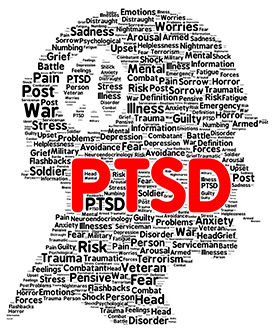Posttraumatic Stress Disorder (PTSD) Treatment in Harmans, MD

Posttraumatic stress disorder (PTSD) is a mental health condition that affects men, women and children who have witnessed or been a part of a traumatic event. Also called PTSD, shell shock, or just posttraumatic stress, the condition can be caused by a variety of events including:
- Military combat
- Natural disasters
- Terrorist incidents
- Serious accidents
- Physical abuse during childhood or adulthood
- Sexual abuse during childhood or adulthood
Many people are able to return to a normal level of function after a traumatic event. For others, the stress of an event can linger and develop into posttraumatic stress disorder.
People with PTSD will often relive the traumatic event through nightmares or flashbacks and have a variety of other symptoms that can negatively impact their daily life.
To learn more about PTSD, please call (410) 266-3613 or contact Annapolis Integrative Medicine online.
PTSD Symptoms
PTSD may develop as early as three months after an event. For others, it may take years to see symptoms. Symptoms of PTSD are grouped into four types: intrusive memories, avoidance, negative changes in mood or thoughts and finally changes in emotions. The most common symptoms include:
- Unwanted memories of an event
- Reliving the event in the mind (flashbacks)
- Nightmares of the event
- Emotional or physical reactions to a memory
- Avoiding people and places that remind you of a traumatic event
- Losing emotion, or feeling “numb”
- Loss of interest in activities
- Hopelessness
- Trouble maintaining relationships
- Memory problems, including forgetting key parts of the trauma itself
- Anger and aggression
- Constant feeling that danger is near
- Feelings of guilt or shame
- Destructive behaviors (alcohol, drugs, or reckless driving) and more
PTSD Diagnosis
Posttraumatic stress disorder will be diagnosed based on your symptoms. You will need to start by seeing your primary health provider for a thorough physical examination, just to make sure there isn't a physical trigger of your symptoms.
When you are there, make sure to be very honest with your provider about your feelings. Try to provide him or her with a timeline of when your symptoms began and how they have progressed. If no physical issues are found, you may be referred to a mental health professional to complete the diagnosis.
To be officially diagnosed with PTSD, you will need to meet the American Psychiatric Association's description of symptoms. You won't need to have every symptom on the list. Your mental health or primary care provider can tell you more.
PTSD Treatment
Posttraumatic stress disorder is most effectively treated if identified. Psychotherapy is thought to be among the most effective methods of treatment. All types of therapy will help you process traumatic memories in a more effective ways but you may need:
- Cognitive behavioral therapy to process negative emotions or thoughts more effectively
- Exposure therapy to help you face reenactments of the traumatic event in a safe, controlled way
- Eye movement desensitization and reprocessing to develop controlled eye movements during exposure therapy and control reactions to traumatic memories
In addition to talk or psychotherapy, you may be prescribed medications like antidepressants, anti-anxiety drugs and sometimes medications to help control nightmares. Your provider will recommend any necessary medications and help you adjust them as needed.
Request More Information
To learn more about posttraumatic stress disorder and get help, please call (410) 266-3613 or contact Annapolis Integrative Medicine online.
Annapolis Integrative Medicine
Address
1819 Bay Ridge AveSuite 180
Annapolis, MD 21403
(410) 266-3613
www.annapolisintegrativemedicine.com

